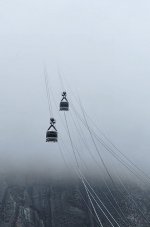- Messages
- 3,839
- Name
- Richard
- Edit My Images
- Yes
Oh I know, and I've maybe used the manual controls a total of 5 times since I've got the phone, at most. It's not something that plays to a phone camera's strengths, they are designed to do it all for you and the computational processing gets the best out of what is still a very cheap, crappy lens in front of a tiny sensor. There just seems to be a perception from some members that all phone cameras are awful and take terrible images, which is not the case anymore, certainly for a high spec phone anyway. They are still nowhere near a proper camera, but they are much better than they used to be. As the saying goes, the best camera is the one you have with you. My phone is pretty much always with me. My Fuji X-T4 isn't with me 95% of the time.You can certainly ‘change’ those things, but let’s be honest about what those changes actually do.
The very largest apertures will not give you a shallow DoF unless you’re shooting at macro distances (so genuinely all images have a fairly large DoF). Macro is something phones are good at btw, let’s play to their strengths . Shutter speeds other than ‘fast enough to avoid shake’ aren’t really useful, and high iso images are a muddy mess due to sensor size.
So Yeah great we have ‘control’ but just like bridge cameras, they’re not useful in the same way that they are on an actual reasonably sized sensor.
There are many things my phone can't do. I can't shoot motorsport with it, at all. Portrait mode, the fake bokeh, is still awful and I never use it as it invariably looks fake. But a modern phone is a decent photographic tool in its own right, as long as you're aware of the limitations.






